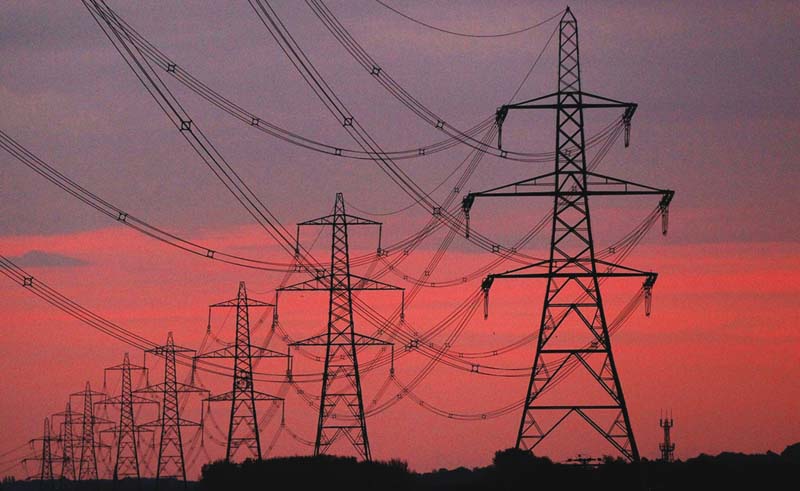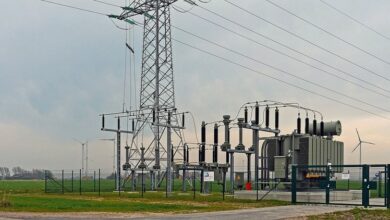A grassroots campaign is underway to end Egypt’s embryonic nuclear ambitions in the town of Dabaa — or at least to relocate them. Meanwhile the Ministry of Electricity, and its subordinate the Egyptian Atomic Energy Authority, are sticking to their guns regarding their nuclear aspirations, which have been dubbed “a national project” and an “issue of national pride.”
Dabaa is the planned site for a massive energy station that would measure around 55 square km, a dream of the Egyptian government since 1981.
The ministry insists on going ahead with the construction in Dabaa, claiming that it would be too expensive to relocate the planned nuclear power plant away from this small, northwestern town by the Mediterranean Sea.
The campaign’s first press conference — which included participants from environmental and human rights NGOs along with residents of Dabaa — took place at the Journalists’ Syndicate on Sunday. Several other conferences, protests and awareness-raising programs are scheduled to be organized over the next few months to shed light on the plight of local residents, and provide information about potential alternatives to nuclear energy.
“The state insists on pushing ahead with its nuclear project on our lands — but the only way they will be able to continue with this project is over our dead bodies,” said Mehanna Abdel Hamid, Dabaa’s mayor, during the press conference.
Residents and activists have denounced the destruction of homes, wells and trees along with the confiscation of lands used for agriculture, grazing, fishing and fowl-hunting as a result of construction work on the plant.
“Decades ago, the authorities promised us improved infrastructure, public utilities, irrigation networks and employment opportunities,” said Abdel Hamid.
“What we got instead was the destruction of some 350 of our homes, and the confiscation of our lands on which we grow figs, olives, and grain. They also took away our stone quarries along with our fishing and quail-hunting grounds in order to build the nuclear power plant,” the mayor continued.
According to Ahmed Mansour, a member of an NGO-based fact-finding mission to Dabaa, “The media focuses on Egypt’s nuclear ambitions and development issues, yet neglects to mention the basic rights of Dabaa’s residents.”
While screening a slideshow of photos from his fact-finding mission for the press, Mansour pointed to a photo of a large ditch in the desert with pipes strewn around the sand, stating, “As you can see here, this is what our nuclear power plant in Dabaa looks like after 31 years of work.”
“This is not a nuclear reactor, as the media portrays it to be. Yet the media calls local residents thugs, traitors and terrorists for allegedly infringing upon this site,” claimed Mansour.
In January of this year, media reported that Dabaa’s residents had stormed the plant and stolen radioactive materials.
Hamdy Hafeez, a local resident, denied these allegations. “With the disappearance of the police forces on 28 January, we formed popular committees to protect both our private lands and state-owned lands from thieves and armed gangs,” he explained.
Hafeez admitted that the fences and walls surrounding the site of the planned reactor had been repeatedly destroyed and torn down by local residents who claim the land as their own. “However, no radioactive materials were stolen, and no equipment or documents were stolen either,” he claimed.
Thousands of residents of Dabaa and neighboring towns have protested against the planned site of the power plant. Since August 2011, locals have held sit-ins, gone on marches and blocked highways in protest, finally clashing with security forces after negotiations with local officials broke down.
“I initially supported the idea of a nuclear power plant, until the authorities began confiscating our lands and property, providing us with little or no compensation for what they took from us,” said Hafeez, adding that “We also began to worry about our safety and future following the Fukushima nuclear crisis [in March 2011].”
Abdel Hamid pointed out that the government had sidelined its nuclear ambitions in Dabaa following the Chernobyl disaster in 1986, only to return to its ambitions in the mid-1990s and 2000s. “Yet the disaster at Fukushima led to the ringing of further alarm bells regarding the dangers of nuclear energy,” he stated.
According to Dr. Soheir Mansour, an environmental activist and member of Egypt’s Green Party, “Authorities here claim that nuclear energy is safe and secure. However, it has been proven to cause cancers and tumors along with other serious illnesses.”
“Egypt’s nuclear dream could end up being a nuclear nightmare,” Mansour claimed.
The environmentalist added that a nuclear leak could produce fallout, which would affect all of Egypt, not just Dabaa. According to Mansour, nuclear energy in Egypt would be “a ticking time bomb waiting to explode.”
Egypt is ill-equipped to properly dispose of nuclear wastes, Mansour alleged, and the country “does not have the same industrial safety standards or medical standards as the industrialized countries of the north.”
Mansour said that Germany, Italy, Sweden, and Switzerland amongst other developed countries are moving away from nuclear energy and are phasing out their nuclear power plants over the next decade or so, while Egypt — along with Saudi Arabia, Jordan, the United Arab Emirates and other Arab states — is attempting to do the opposite.
“Nuclear energy is costly and hazardous. Egypt can tap into clean, safe and free energy, which is abundantly available. Egypt is very well situated to tap into these energies,” Mansour said, explaining that the installation of simple solar and wind power technologies could securely meet Egypt’s future energy needs, while bio-fuels generated from domestic waste could also be a viable energy source.
Mansour concluded by criticizing those who expect Egypt to acquire nuclear weapons by developing nuclear power plants. She pointed out that Israel — the only country in the Middle East and North Africa region with a nuclear arsenal — developed its nuclear warfare capacities through nuclear research reactors, not through electricity-generating stations, which operate on nuclear power.
Mansour added that Egypt’s nuclear research plant in Inshas, located in the Nile Delta Governorate of Sharqiya, could potentially serve such a purpose “if wasn’t so plagued by corruption and mismanagement.”
Gasser Abdel Razeq, a human rights activist at the Egyptian Initiative for Personal Rights (EIPR) said that the campaign would present a study of these alternative options to President Mohamed Morsy in the hopes that he would be convinced to scrap the power plant altogether, or at least move it away from the North Coast.
According to Abdel Razeq, two further conferences are planned over the next few months which will focus on Egypt’s renewable energies and alternatives to nuclear energy. Further protests in Cairo and Dabaa against this nuclear project are also being planned.
Three independent NGOs, including the Network of Housing and Land Rights, EIPR and the Egyptian Center for Civil and Legislative Reforms participated in fact finding missions to Dabaa and have issued their first report, a 29-page booklet detailing the violations of housing and land rights in the name of constructing the power plant.
Organizers against the plant have also set up a Facebook page entitled “The campaign to stop the nuclear reactor project in Dabaa,” while EIPR frequently issues statements and updates about conditions in the town.




